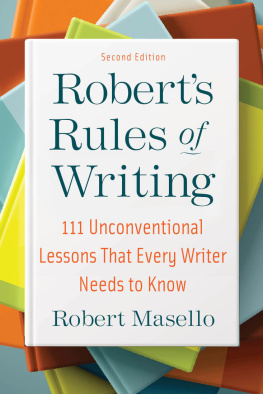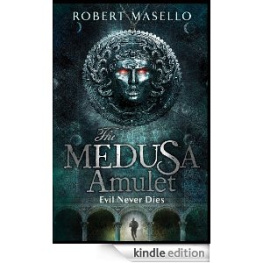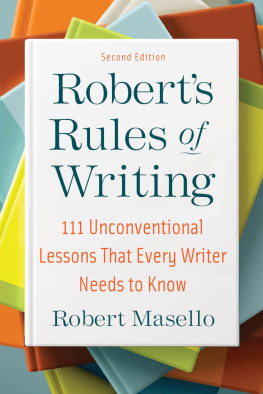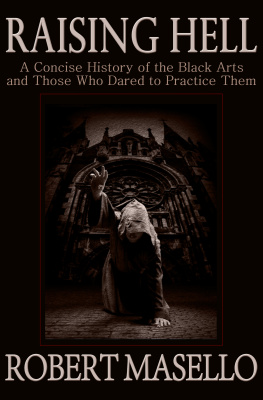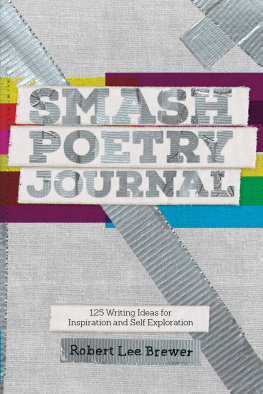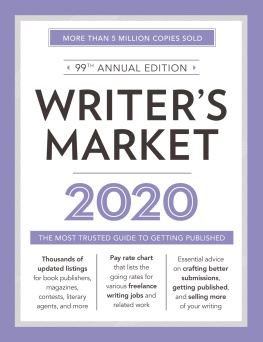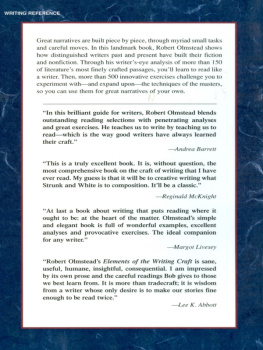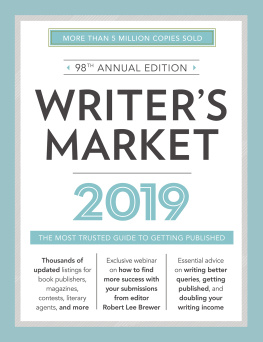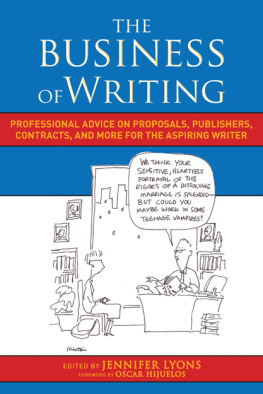

Copyright 2021 by Robert Masello
All rights reserved. Copyright under Berne Copyright Convention, Universal Copyright Convention, and Pan American Copyright Convention. No part of this book may be reproduced, stored in a retrieval system, or transmitted in any form, or by any means, electronic, mechanical, photocopying, recording or otherwise, without the express written consent of the publisher, except in the case of brief excerpts in critical reviews or articles. All inquiries should be addressed to Allworth Press, 307 West 36th Street, 11th Floor, New York, NY 10018.
Allworth Press books may be purchased in bulk at special discounts for sales promotion, corporate gifts, fund-raising, or educational purposes. Special editions can also be created to specifications. For details, contact the Special Sales Department, Allworth Press, 307 West 36th Street, 11th Floor, New York, NY 10018 or .
25 24 23 22 21 5 4 3 2 1
Published by Allworth Press, an imprint of Skyhorse Publishing, Inc. 307 West 36th Street, 11th Floor, New York, NY 10018. Allworth Press is a registered trademark of Skyhorse Publishing, Inc., a Delaware corporation.
www.allworth.com
Cover design by Mary Ann Smith
Library of Congress Cataloging-in-Publication Data is available on file.
Print ISBN: 978-1-62153-783-0
eBook ISBN: 978-1-62153-784-7
Printed in the United States of America
CONTENTS
PREFACE
If ever there was a time when the world was in need of good writingwhen it was clamoring for clear and convincing prosethat time is now. And that goes for everything from magazine articles to memoirs, short stories to blog columns, novels to screenplays. Were inundated with misinformation and disinformation, fake news bulletins and alternative facts (heretofore known as lies) and unending political spin from a bunch of bloviating dopes on TV. The academics are just as bad, turning normal human discourse into minefields across which no mere mortal dare tread. There are stories in literary quarterlies that even I, an English major from a fine old college, cannot begin to figure out and poems so inscrutable they positively scare me. Not to mention the endless proliferation of books that purport to teach anyone to writeI swear, if one more person ever says to me, Hey, if you can talk, you can write, my head is going to explodeall of them written by people who cant write anything but advice for other writers.
So where do I get the nerve to add yet another book on writing to the already groaning shelf? Well, call it hubris, call it the need to unburden myself after a long and reasonably successful run at this, call it the altruistic desire to impart what Ive learned the hard way after writing over twenty novels and nonfiction books, thousands of articles and essays for major magazines and newspapers, and episodes of popular TV shows that I myself, to be perfectly frank, would never have watched. (If you really feel the need to know more, you can read the About the Author page at the end of this book, where I name names, list credits, and disclose the details of my checkered past, all in an effort to assist my future biographers.)
What Im not going to try to do in this book is untangle the thorny knots of grammatical construction (a dependent clause can only take the subjunctive case when preceded by a dangling participle), nor am I planning to offer a cheerleading session, assuring you that every word you write is a pearl. (Mine arent, either.) This is instead a kind of tough love, the distillation of all the rules that professional writers, those of us who do this for what passes for a living, have figured out over the yearsthe straight and simple rules that address and smooth over the routine difficulties that we all face, whether were working on a mystery novel or a movie script, a personality profile or a first-person essay, a magazine piece or an epic poem. Some of these rules, let me warn you, are provocative, controversial, counterintuitive. You may even want to duke it out with me over some of them, and thats okay, since you dont know where I live. (I hope.)
But youve just got to trust me when I say that these rules have proven themselves over time to be of great, practical use to many writers of all stripes and all abilities. I know that they have been to me.
Which is why Im calling themwait for the big reveal Roberts Rules of Writing.
RULE 1.
BURN YOUR JOURNAL.
Just about every writing book I know says writing is a muscle that you have to regularly exercise and keep in use, and that if you dont know what to write, you shouldnt let that stop you. You should just start keeping a journal and writing down, at random, all your thoughts and ideas.
In my bookthis one to be exactthats almost always an immense waste of time and paper. The only muscle youll be exercise by keeping a journal is your hand, and for that youd be better off jumping rope.
If you feel like keeping a journalsomething that neither you nor anyone else on earth will ever want to readby all means be my guest.
But if you want to write something that may eventually see the light of day, that a magazine might buy, a publisher publish, or a producer produce, then youll have to knock off the journaling and do the grunt work that real writing requires.
Nine out of ten struggling writers get stuck right there. Instead of confronting all the very real problems that any book or article or story poses, they retreat to those blasted journals, on the theory that theyre loosening up their artistic tendons and free-associating their way to fresh ideas.
All theyre really doing is keeping the manufacturers of those fancy blank books, the ones that uselessly clutter up the shelves at your local bookstores, in business.
All too often, writing in a journal is just a stall, a waiting game, a way to tell yourself that youre working when youre not, that youre doing something of value when youre just using up paper, that youre a writer when in fact youre just going through the motions of one. Look at me! I had blank paper in front of meand now its filled with words!
Anyone can do that. Anytime.
The hard part of writing isnt scribbling words on a page. The hard part is scribbling words that mean something, that make sense, that build a narrative or lay out an argument, that construct a scene or articulate a position. Its not about how many pages you can cover with ink in a day. In some cases, a good days work might be a couple of paragraphs. But if those two paragraphs are right, then theyre a lot more valuable than ten or twenty pages of idle burbling.
Writing takes deliberation and thought, craft and commitment.
If youre serious about writing, burn the journal, and get to work.
RULE 2.
GET A PEN PAL.
But I dont want you to think Im too hard-hearted.
I know what its like to be stuck, to have the urgent desire to write, but nothing particular to say just now. Thats usually when those alluring journals come out.
But try this. Instead of writing the stream-of-consciousness twaddle that generally fills those blank pages, try this insteadwrite a letter, to a friend.
Writing has to have a purpose; its meant to communicate something , to someone , and if youre not ready to write for the general publicmany times were notthen try writing for a very specific audienceone that you know will be happy to hear from you. (People are so astonished to get letters these days, you might want to send a text in advance to warn them that one is on the way, lest they keel over in shock.) If you must, you could even make your letter an e-mail, but theres something about the ephemerality of e-mails, or texts and tweets for that matter, that virtually cries out for sloppiness and imprecision. A good, old-fashioned letter, hand-scrawled or printed out on paper, will require you to think before you write, as well as permit you to edit and revise and amend.
Next page
